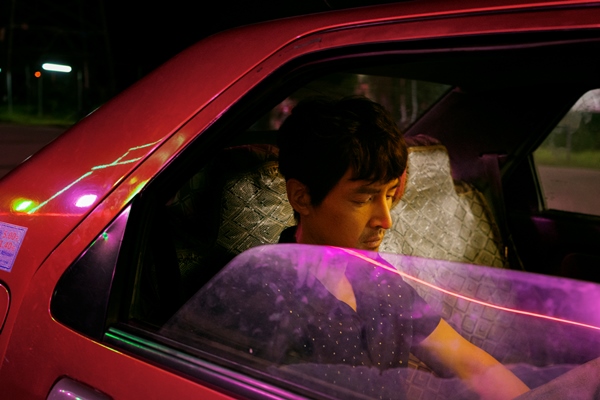

The title of this slow-burning thriller from China implies a lengthy, ultimately pointless quest for some elusive goal. While that would be accurate, it wouldn’t do justice to the actual film, which is full of striking visuals and terrific performances. The introduction features a grizzled thief and ex-convict, Zenong Zhou (Hu Ge), who waits at a bus station in Wuhan for his wife to arrive so they can both escape, but he’s informed by a mysterious woman in red, Aiai Liu (Gwei Lun Mei), that Zhou’s spouse will not be showing up.
From the start, writer-director Diao Yinan knows how to draw viewers in as Zhou and Liu speak in clipped sentences, deepening the mystery of exactly what kind of trouble Zhou is in. Flashbacks from both perspectives fill in the blanks: Zhou’s gang, which specializes in stealing motorbikes, starts a war with a rival crew that culminates in a bloody double-cross. However, Zhou’s accidental shooting of a police officer forces him to go on the lam with a hefty bounty on his head.
Liu, meanwhile, is revealed to be a prostitute hired by one of Zhou’s few remaining allies to help reunite him with his wife, Shujun (Wan Qian, appearing mostly in flashback). She offers to accompany the now-alone Zhou since she is from the same lakeside city where he will attempt to hide out. The pair, who share a tension from the start, have their relationship placed front and center thanks to the non-linear structure. We become invested in whether Zhou gets away from the police hunt and if Liu betrays him for the reward money.
The rapidly industrializing Chinese countryside serves as the backdrop in the latter half, and it turns out to be the ideal setting for this neonoir. Diao depicts a boomtown as full of shadows and urban decay, where masses of the poor live in squalor. He views everything through a cynical lens, even Goose Lake, which is supposed to be a major tourist draw but is frequently foggy and sick-looking. One of the most memorable scenes involves Zhou and Liu passing a billboard for a beachside complex under construction. However, the artist’s rendition of skyscrapers against a picture-perfect sky quickly gives way to the less-appetizing reality.
Diao has a knack for noir, but he puts his own stamp on the material with an occasionally quirky and idiosyncratic tone. In the foregrountd of one sho, a group of police officers search for Zhou in glowing tennis shoes. There is also a sequence at a zoo where the camera focuses on the caged animals, which are watching the henchmen who are, in turn, on the lookout for Zhou.
The main characters fill all of the archetypal roles we expect. Along with being tough as nails, Zhou has multiple tattoos and a perpetual five o’clock shadow, making him an ideal pulp anti-hero—though he might also be the most honorable man in his line of work. As for Liu, she has moments where she comes across as cool and aloof, while others hint that she might be the proverbial hooker with the heart of gold. We may not know exactly where her loyalties lie for the most part, but that doesn’t mean we don’t empathize with her as she alternately becomes intimidated and brutalized by cops and criminals alike. Thanks to actress Gwei’s gamine appearance and expressive features, she has a built-in vulnerability.
The lack of a propulsive soundtrack—or any background music at all—can make the movie seem languid at times, but Diao frequently punches things up with genuinely exciting set pieces, such as an early fight between an assemblage of gangsters, which starts out with everyone in the same frame before breaking down into a rapid-fire montage of close-ups. There are certainly moments of grisly violence, but they either happen after such a slow build-up of suspense that they offer a sense of release or they are so over-the-top as to leave one speechless.
The ending features one last clandestine meeting that may feel cold and emotionless to some, but can be viewed as two characters coming to accept one another in spite of all they’ve done leading up to the moment. The director leaves it to viewers to decide on their own about the scene, which like so much of this film, could be interpreted as savage and bleak, strangely beautiful, or somewhere in between.






Leave A Comment